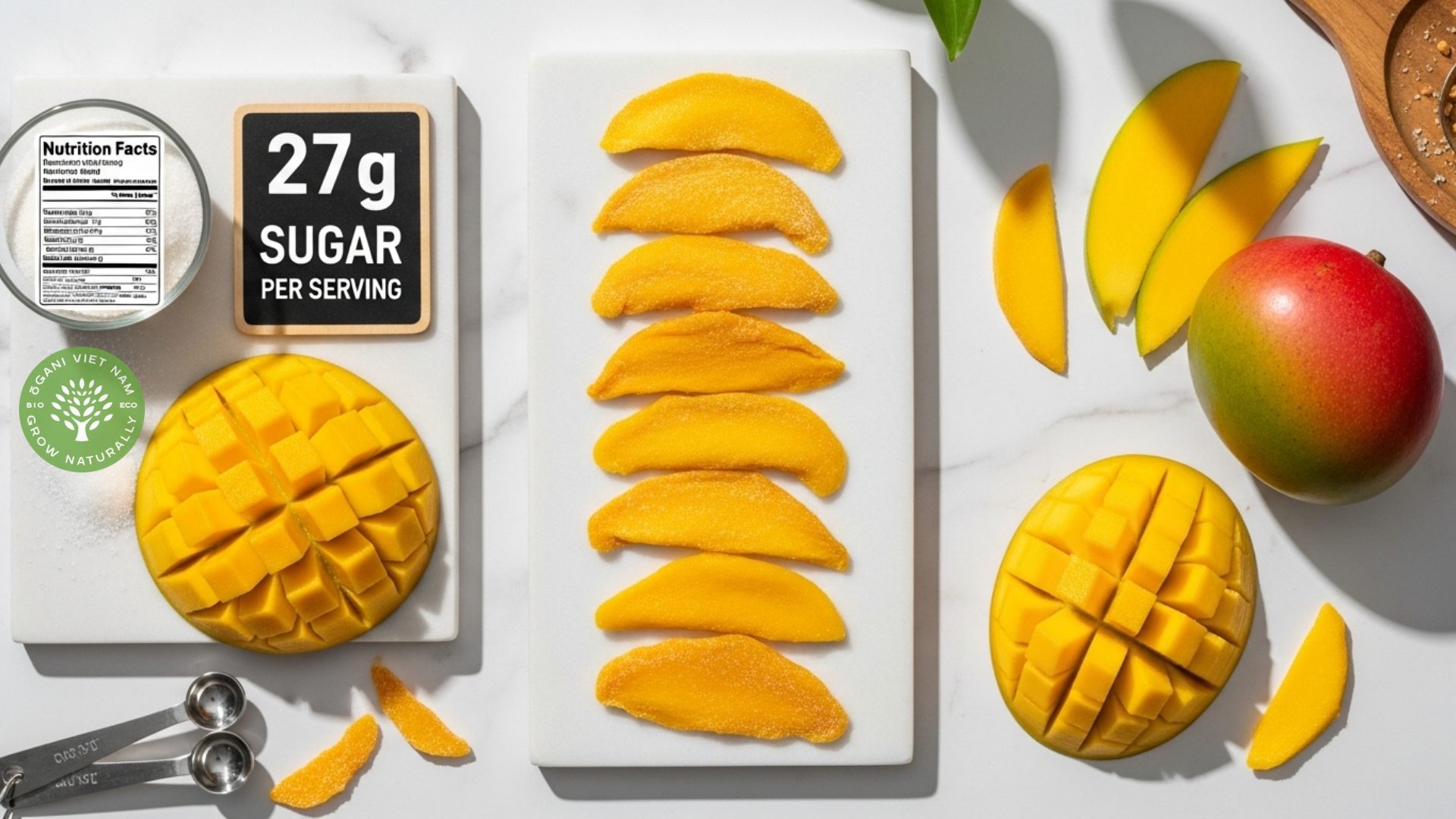Yes, dried mango is high in sugar – containing approximately 27 grams of sugar per one-ounce serving, which is significantly higher than fresh mango. At Ogani Vn, we understand your concern about sugar content in dried fruits, and we’re here to help you make informed choices about this popular tropical snack.
The concentrated nature of the dehydration process removes water while preserving natural sugars, making dried mango a sweet but calorie-dense treat. Understanding these nutritional facts helps you enjoy dried mango responsibly while maintaining your health goals.
Is dried mango high in sugar: understanding the numbers
When fresh mangoes undergo the dehydration process, water content drops from about 83% to less than 20%, concentrating all nutrients – including natural sugars. This concentration effect explains why dried mango is high in sugar compared to its fresh counterpart.
A typical one-ounce serving (about 28 grams) of dried mango contains:
- 27 grams of sugar (natural fructose)
- 31 grams total carbohydrates
- 128 calories
- Minimal protein and fat
For comparison, fresh mango contains only 13 grams of sugar per 100-gram serving. The sugar concentration in dried mango is nearly double that of fresh fruit, making portion control essential for those monitoring their sugar intake.
Why is dried mango high in sugar compared to fresh fruit
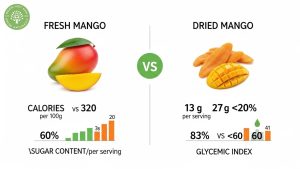
The dehydration process dramatically alters the nutritional profile between fresh and dried mangoes. While both versions provide essential vitamins and minerals, the concentration levels differ significantly.
Sugar and calorie density
The question “is dried mango high in sugar” becomes clear when examining caloric differences. Fresh mango delivers about 60 calories per 100 grams, while dried mango packs approximately 320 calories in the same weight. This dramatic caloric density explains why dried mango is high in sugar, stemming primarily from concentrated natural sugars – fructose, glucose, and sucrose.
The glycemic index further confirms that dried mango is high in sugar, sitting at 60 and creating a medium impact on blood sugar levels. Fresh mango has a lower glycemic index of around 51, making it a gentler option for blood glucose management.
Vitamin and mineral retention
While answering “is dried mango high in sugar” reveals concerning sugar levels, dried mango retains many beneficial nutrients. The concentration process preserves vitamin A, vitamin C, and essential minerals like potassium and magnesium. However, some heat-sensitive vitamins may decrease during processing.
Fiber content also concentrates, providing about 3 grams per ounce in dried mango compared to 1.6 grams per 100 grams in fresh fruit. This fiber helps slow sugar absorption, moderating blood glucose spikes even though dried mango is high in sugar content.
Is dried mango high in sugar: health impact analysis
The natural sugars in dried mango affect your body differently than refined sugars, but the high concentration still requires mindful consumption. Understanding these health implications helps you incorporate dried mango into a balanced diet effectively.
Blood sugar impact and diabetes considerations
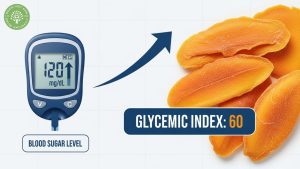
For individuals with diabetes or prediabetes, dried mango is high in sugar enough to cause noticeable blood glucose elevations. The glycemic index of 60 means moderate impact on blood sugar, but the concentrated serving size can amplify this effect.
Research published in nutritional studies suggests that consuming dried mango in small portions (1/4 cup or less) may help minimize blood sugar spikes while still providing nutritional benefits. Pairing dried mango with protein or healthy fats can further moderate glucose response.
Weight management considerations
The caloric density of dried mango makes it easy to overconsume calories quickly. A small handful can contain 200-300 calories, primarily from natural sugars. For weight management, treating dried mango as an occasional treat rather than a regular snack proves more effective.
However, the fiber content and natural compounds in dried mango may provide satiety benefits when consumed mindfully. The key lies in portion awareness and incorporating it within your daily caloric goals.
Smart choices when dried mango is high in sugar
Not all dried mango products are created equal. At Ogani Vn, we’ve observed significant variations in sugar content and processing methods across different brands and preparation styles.
Reading labels for added sugars
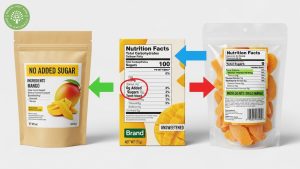
Many commercial dried mango products contain added sugars beyond the fruit’s natural content. These additions can increase total sugar content to 35-40 grams per serving, making an already sweet snack even more problematic for blood sugar management.
Look for products labeled “no added sugar,” “unsweetened,” or “naturally sweet.” The ingredient list should show only mango or mango with natural preservatives like citric acid or sulfur dioxide.
Organic vs conventional processing
Organic dried mango typically undergoes gentler processing methods that may better preserve nutritional integrity. Some conventional products use sulfur dioxide to maintain color and extend shelf life, which doesn’t affect sugar content but may concern those with sulfite sensitivities.
Portion control strategies
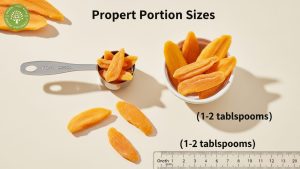
Since dried mango is high in sugar, successful incorporation into your diet depends on smart portioning:
- Limit servings to 1-2 tablespoons (about 15-20 grams)
- Pre-portion into small containers to avoid mindless snacking
- Combine with nuts or seeds to balance macronutrients
- Use as a topping for yogurt or oatmeal rather than eating alone
Frequently asked questions
Q: How much dried mango can I eat daily without exceeding recommended sugar limits? A: The American Heart Association recommends limiting added sugars to 25 grams daily for women and 36 grams for men. Since dried mango contains natural sugars, a small portion (1-2 tablespoons) fits within a balanced diet, but monitor your total daily sugar intake from all sources.
Q: Is dried mango better than candy for satisfying sweet cravings? A: Yes, dried mango provides vitamins, minerals, and fiber that candy lacks. However, the sugar content remains high, so moderation is still essential. The natural fruit compounds may offer additional health benefits compared to processed sweets.
Q: Can I eat dried mango if I’m trying to lose weight? A: Dried mango can fit into a weight loss plan when consumed in small portions and accounted for in your daily caloric budget. The fiber content may help with satiety, but the caloric density requires careful portion control.
Q: Does the sugar in dried mango affect blood sugar differently than table sugar? A: Dried mango contains fructose, glucose, and other natural fruit sugars, which your body processes similarly to refined sugars. The fiber content may slow absorption slightly, but the blood sugar impact remains significant due to the concentrated sugar content.
Q: Are there any dried mango varieties with lower sugar content? A: Sugar content varies minimally between mango varieties when dried. However, some brands offer reduced-sugar versions through specific processing methods or blending with other fruits. Always check nutrition labels for accurate sugar content.
Making Smart Choices with Dried Mango
Dried mango is high in sugar, containing approximately 27 grams per ounce – nearly double the concentration found in fresh mango. While this makes it a naturally sweet and satisfying snack, mindful consumption is essential for maintaining healthy blood sugar levels and supporting your wellness goals.
At Ogani Vn, we believe knowledge empowers better food choices. Understanding dried mango’s nutritional profile helps you enjoy this tropical treat responsibly while benefiting from its vitamins, minerals, and natural compounds.
Ready to explore healthier snacking options? Visit our collection of premium dried fruits and discover products that align with your nutritional needs. Our carefully selected dried mango varieties offer natural sweetness without added sugars, helping you satisfy cravings while supporting your health journey.
Read more:
- Dried Mango Is It Good For You: Complete Health Guide 2025
- Best Dried Mango No Sugar Added: Premium Quality Guide
- Calories In Dried Mango No Sugar Added: Complete Nutrition Guide
- Are Dried Mangoes Good For You? The Complete Health Guide
- Dried Mango Nutrients: Complete Guide To Health Benefits And Nutritional Value


